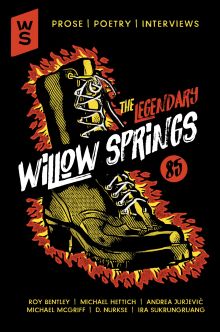
About Andrea Jurjević
Andrea Jurjević grew up in Rijeka, Croatia, in the former Yugoslavia, before immigrating to the United States. Her debut poetry collection, Small Crimes, won the 2015 Philip Levine Poetry Prize, and her book-length translations from Croatian include Mamasafari (Diálogos Press, 2018) and Dead Letter Office (The Word Works, 2020). Her work has appeared, or is forthcoming, in The Believer, TriQuarterly, The Missouri Review, Gulf Coast and The Southeast Review, among others. She was the recipient of a Robinson Jeffers Tor Prize, a Tennessee Williams Scholarship from the Sewanee Writers’ Conference, a Hambidge Fellowship, and the 2018 Georgia Author of the Year award. Andrea lives in Atlanta, Georgia, and teaches at Georgia State University.
A Profile of the Author
Notes on “Nastic Movements”, “Department of Dream Justice” and “Nevada Augury”
“Department of Dream Justice” is haunted by the idea of home and the question of reconstructing oneself after the loss of one’s home, or country, particularly as a parent, and especially as an immigrant parent. I’m often drawn to writing about displacement, and the sense of alienation, but this piece in particular attempts to reconcile the need for intimacy and security with realities of life. I reference a line from the song “La Pistola y El Corazón” by Los Lobos, a beautiful song that claims that there’s no cure for emotional pain.
I started writing “Nevada Augury” during a cross-country road trip with the man I was newly engaged to. At the time I was working on poems that explored the idea of abandon—both the sense of abandon and leaving something behind. The poem finished itself a couple years later, after the sudden death of that relationship. It now seemed the desert had forecasted, or forewarned this ending, and that the abandonment I wrote about might’ve been a premonition. I love Pieter Brueghel and his depiction of how foolish human nature is.
As for “Nastic Movements,” one night during a walk, I noticed a patch of dandelions, all closed up. Dandelions react to darkness, like tulips and poppies and many other flowers. These dandelions, though, looked like they have lost their ‘heads,’ and they made me think of different ways people lose their heads . . . to war, death, trauma, stupidity, love, deception. I wrote the ending lines of the poem first, including the image of a letter falling apart in rain, which I stole from Will Christopher Baer’s novel Kiss Me, Judas.
Music, Food, Booze, Tattoos, Kittens, etc.
I used to be a big fan of Robert Smith and The Cure. I bought Disintegration at 13 from the local Jugoton, the chain record store in former Yugoslavia (Jugoton had a very limited selection of imported music), and every other of their albums from friends who travelled abroad. I wrote to The Cure fanclub in London and would in turn receive fat parcels filled with their newsletter and fan stories and black & white photocopies of the band. I also loved Siouxsie Sioux, Jesus and Mary Chain, Sisters of Mercy, The Smiths, Bauhaus (lots of alternative 70s and early 80s) and heaps of Yugo bands that are unknown to the American audience. Punk rock in particular meant a lot in Yugoslavia. It was a way to mock and attack the establishment… that kind of expression was very uncharacteristic of a communist country. It tricked us into thinking that having music as an outlet was freedom. My hometown, Rijeka, has always had a rich and distinctive music scene, and I grew up surrounded with phenomenal musicians. And I believe music made me the writer I am. I listen to music daily. Recently I’ve been listening to the Verve, Low, Nothing, the Black Ryder, Girls, the Mexican duo Lorelle Meets the Obsolete. I love their moodiness, their dark, sultry atmospherics. But I also love lots of Beck, Brian Eno, Tricky, David Sylvian, John Cale, Sparks, the Kinks, etc.


